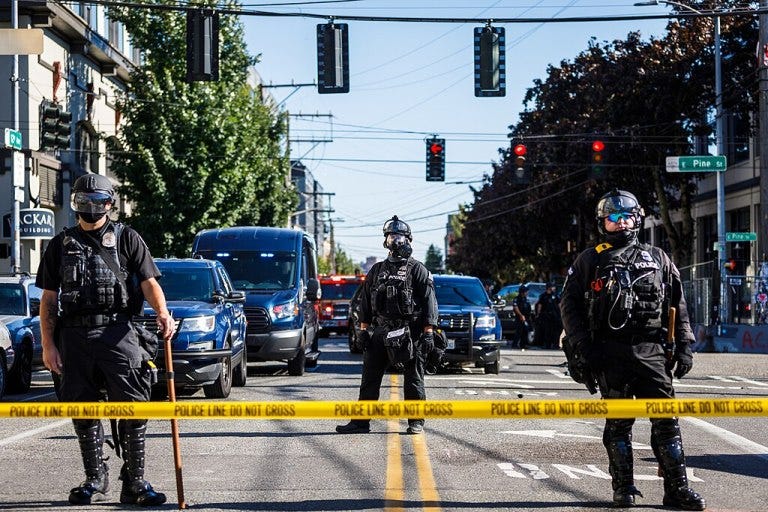Seattle Police Guild Sues Police Department Over Public Records Delays
The lawsuit accuses SPD of illegally delaying public records through a maddening practice called "grouping."

By Erica C. Barnett
The Seattle Police Officers Guild has filed a lawsuit against the Seattle Police Department over its practice of "grouping" multiple public disclosure requests from a single requester and responding to them one at a time, a policy that allows SPD to sit on more recent requests for years while slowly fulfilling older ones.
The lawsuit stems from nine requests SPOG filed between 2020 and 2025; the oldest, from March 11, 2020, is more than five years old. SPOG is asking the police department to hand over the records and pay its attorney fees.
"Our biggest gripe," SPOG president Mike Solan said, is that SPD has determined that SPOG is a "high user" of the system, "and therefore it will take too long to process [our requests.] And for us, when we see other entities granted what appear to be really quick turnoarounds, in terms of days, if not a week, when we’ve got yearslong requests that are not being granted, there’s something not right with the system in terms of being fair and balanced."
Earlier this year, the Seattle Times sued SPD on similar grounds, alleging that SPD was failing to follow the terms of its earlier settlement over the grouping issue. In that settlement, SPD explicitly agreed not to group records requests made more than eight weeks apart—not just for the Seattle Times, but for everyone.
The records SPOG is seeking range from videos of what the lawsuit refers to as the 2020 protests, which the lawsuit refers to as "riots," as well as records about officers' job assignments; the city's decision in early 2020 to reconstitute its encampment removal team, which had included police; and documents related to the city's adoption of Workday, a new payroll system that has issued inaccurate paychecks to many city employees, including police.
"When applying the Grouping Policy, SPD processes only one grouped request at a time, placing the others on hold as if the PRA obligations are suspended," SPOG's lawsuit says. "This practice adds lengthy delays to an already slow process for obtaining SPD records, and signals to the requester that any additional requests will be futile."
SPD's public disclosure division allows requesters to pick a single request for a public disclosure officer to answer, in its entirety, before starting on the second request on the list. "In other words," the lawsuit says, "the City deliberately creates a circumstance where a requestor is required to acquiesce to the City’s improper Grouping Policy in order to supposedly enable the City to process a request that is more important to the requestor.
As we've reported previously, PubliCola currently has nine requests stuck in the grouping process, with SPD working on just one request. At SPD's current rate of progress, we don't expect answers to most of our requests for many years, if ever, and have more or less stopped filing requests. By creating a policy that allows SPD's legal department to delay records requests indefinitely SPD has effectively overturned the state Public Disclosure Act for anyone else who files multiple records requests.
Several years ago, compounding this problem for members of the press, SPD's media relations department began responding to basic media questions by telling (certain) reporters to file a records request—knowing full well, based on experience, that filing a request was about as effective than screaming into a hole in the ground. (The media folks got better once Sue Rahr replaced Adrian Diaz as interim chief a year ago; the public disclosure response team, which is part of SPD's legal division, did not.).
City Attorney Ann Davison's office filed a terse response to the lawsuit that denied the allegations but did not go into detail about why they believe SPD is in the right. Davison's office did not immediately respond to questions sent late Monday afternoon, but we'll update this post if we hear back.
"We hope that this lawsuit will illustrate our concerns with [SPD] not following the rules," Solan said. "I think that is a fair thing to ask: Change the policy and grant us our public disclosure requests."





Even a broken clock can find a truffle